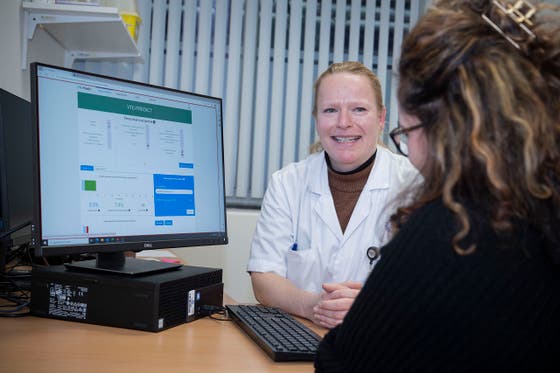Individual risk of new thrombosis and pulmonary embolism predictable

UMC Utrecht has developed an online tool that can predict for each individual the risks of a new thrombosis and severe bleeding. This tool, VTE-PREDICT, uses a patient's age and gender, among other factors, to estimate the risks. Through the tool, the physician calculates the risk of new thrombosis and severe bleeding. This information helps the patient and doctor to make a shared decision about stopping or continuing blood thinners after a thrombosis.
Every year, about 30,000 people in the Netherlands get a venous thrombosis. "A thrombosis is a blockage of a blood vessel by a blood clot," says Mathilde Nijkeuter, internist-vascular medicine specialist at UMC Utrecht. "If a clot clogs a vein in a leg, we call it a thrombosis leg. If this clot breaks loose, it enters the lungs and is called a pulmonary embolism. Pulmonary embolism and thrombosis are two different manifestations of the same disease: venous thromboembolism (VTE). Treatment for thrombosis consists of blood thinners for at least three months. After that, doctor and patient together make a choice to stop blood thinners or continue treatment for life."
The average patient
If the venous thromboembolism is not due to temporary risk factors like surgery or birth control pills, the risk of a new thrombosis is high: nearly one-third of people will develop a new pulmonary embolism or thrombosis within five years. With lifelong treatment with blood thinners, this risk is much lower, but the disadvantage is that they give a chance of severe bleeding, for example, a brain hemorrhage. Maria de Winter has defended her PhD-thesis about individual treatment decisions in patients with venous thrombosis in May 2022 and tells: "The risk of serious bleeding and a new thrombosis is different for everyone and depends on risk factors, such as age and gender. Guidelines recommend weighing these risks, but only average risks are known for the average patient. This leads to a dilemma: How should patient and physician jointly make a choice if individual risks are not known?"
E-health tool
UMC Utrecht has now developed an online tool, VTE-PREDICT, that can predict for each individual the risks of a new thrombosis and severe bleeding events. The tool uses a patient's age and gender to estimate the risks. "Through the tool, the physician calculates the risk of a new thrombosis and severe bleeding," said Jannick Dorresteijn, internist-vascular physician at UMC Utrecht. "This information helps the patient and physician to decide together about stopping or continuing blood thinners after a thrombosis. The tool is based on a computational algorithm and for this purpose aggregated large data sets, big data, from studies conducted in the past were used."
Available to healthcare providers
The tool is intended for all healthcare providers who treat patients with thrombosis or pulmonary embolism: for internists, pulmonologists, general practitioners and also nursing specialists within these fields. The online tool complements the existing tool, U-Prevent, which can be used to calculate a personal risk of cardiovascular disease. This involves the effect of blood pressure and cholesterol-lowering drugs and blood thinners to prevent heart attacks and strokes. U-Prevent is now used daily by a thousand health care providers from home and abroad and is also included in Dutch and European guidelines.
About the VTE-PREDICT tool
The VTE-PREDICT tool was created in collaboration with ORTEC B.V. through a grant from ZonMw and through collaboration with a large number of international research institutes from England, the United States, Canada, Sweden, Denmark and Norway, among others. Through research, the accuracy of the algorithm was also confirmed in similar but independent datasets. The results of the study were published 17 January in the European Heart Journal.
